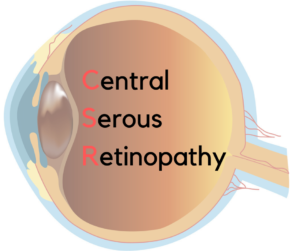Central Serous Retinopathy | CSR


Onset of symptoms can occur very quickly, for example, over night.
Retinal Fluid
In patients with central serous retinopathy, pockets of fluid develop underneath or within the layers of the retina. We are not exactly sure why this develops. While there may be a relation to “stress,” we have no clear explanation as to how “stress” may cause the disorder.
The fluid causes the affected areas of the retina to become less sensitive as there is a physical separation between the layers of the retina.
When the fluid occurs in the macula, central vision is affected and other symptoms of CSR become very noticeable.
CSR can affect either eye multiple times.
Symptoms of CSR
CSR does not always affect the macula. When it affects less sensitive areas of the retina, visual symptoms may not be noticed and patients may not seek medical attention.
The macula is the most sensitive portion of the retina giving us our best ability to see fine detail, color perception and central vision. Thus, any changes in the macula translate to obvious changes in the vision due to the sensitivity of the macula.
Blurry vision develops as the photoreceptors lose contact with the retinal layer underneath. Distortion can occur as the surface of the retina is no longer smooth. The retinal surface becomes elevated and can cause minification. This can also cause a “hyperopic shift” in the glasses prescription as the surface of the retina moves ever so slightly closer to the front of the eye.
Treatment of Central Serous
Usually no treatment is needed. There is an association with use of steroids: nasal sprays, ear drops or systemic. Stopping these medications may reverse the CSR.
Most cases improve by simply waiting for several weeks or months. Usually the vision loss is mild to moderate and is well tolerated.
Laser treatment can be helpful but is not always a possibility. Photodynamic therapy has been shown to be helpful as well. Occasionally intravitreal injections can help improve cases not improving on their own.


